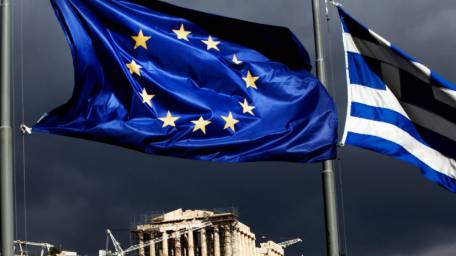-
Tips for becoming a good boxer - November 6, 2020
-
7 expert tips for making your hens night a memorable one - November 6, 2020
-
5 reasons to host your Christmas party on a cruise boat - November 6, 2020
-
What to do when you’re charged with a crime - November 6, 2020
-
Should you get one or multiple dogs? Here’s all you need to know - November 3, 2020
-
A Guide: How to Build Your Very Own Magic Mirror - February 14, 2019
-
Our Top Inspirational Baseball Stars - November 24, 2018
-
Five Tech Tools That Will Help You Turn Your Blog into a Business - November 24, 2018
-
How to Indulge on Vacation without Expanding Your Waist - November 9, 2018
-
5 Strategies for Businesses to Appeal to Today’s Increasingly Mobile-Crazed Customers - November 9, 2018
Greece and creditors in deal to release more bailout cash
Greece’s Finance Minister Euclid Tsakalotos, left, speaks during a news conference as Economy Minister Giorgos Sathakis listens, in Athens on Tuesday, November 17, 2015.
Advertisement
Greece’s global creditors are ready to pay out 12 billion euros ($12.9 billion) in much needed bailout funds and bank aid, Eurogroup chief Jeroen Dijssebloem said on Monday, AFP reports. “It was a hard negotiation that was held under a lot of time pressure”, Tsakalotos said.
In addition to the 2 billion euros ($2.13 billion) in aid disbursement, the funds also include 10 billion euros ($10.65 billion) to recapitalize beleaguered Greek banks.
The government is to submit the agreed measures to parliament later Tuesday for a vote on Thursday, the minister said. The bids offered for new shares reflect discounts of more than 90 percent compared to where the stocks now trade, as the country’s two biggest lenders try to cover a combined hole of about 8.6 billion euros. This will then pave the way for the cash release by the end of the week and finally kick-start the process of plugging a capital hole in Greece’s four biggest banks.
Greece’s creditor powers have yet to begin talks over reducing the country’s €330bn debt pile – a key demand of prime minister Alexis Tsipras in return for signing up to an onerous new bail-out.
The European Central Bank said last month that Greek banks need €14bn of extra cash to stay afloat while Greeks are still restricted to cash withdrawals of €420 a week.
The agreement removed a major obstacle holding up fresh loans under a third, €86 billion bailout programme for Greece. The sum that the banks will get is lower than many had anticipated.
Greece has secured the disbursement of its first and most strategically crucial €2 bn plus €10 bn disbursement tranche of the bailout program secured this summer.
Advertisement
Once the promised reforms have been passed and the bank recapitalization has taken place, discussions between Greece and its creditors can move on to how to lighten Greece’s public debt load, which after the anticipated recession could rise to around 190 percent of the country’s annual gross domestic product.





























